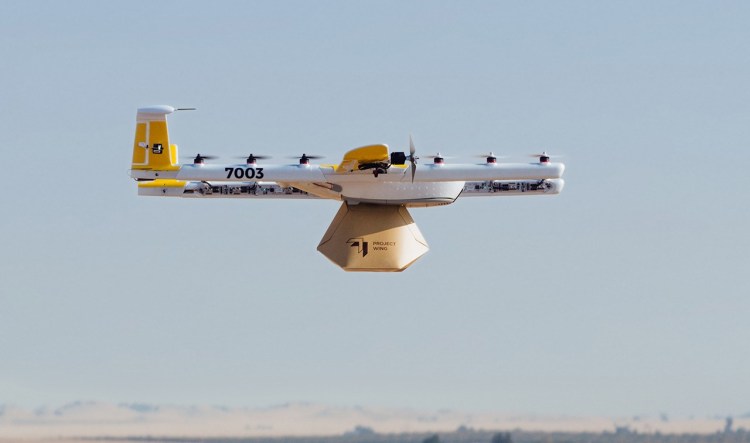Watch all the Transform 2020 sessions on-demand here.
Wing, a graduate of Google parent company Alphabet’s X R&D lab, aims to develop drones that might one day be used to deliver packages to customers’ doorsteps. The only problem? They’re too noisy.
According to The Wall Street Journal, Wing’s parcel-carrying drones, which were deployed in a rural area of southeastern Australia in October 2017 as part of a pilot program, have disrupted the lives of some longtime residents, who say that they don’t use their yards as much. (The neighbors of a Wing customer who spoke to the Journal have requested that she “stop getting deliveries.”) And the noise — which some accounts compared to that of a chainsaw — tends to spook pups, a local dog club president told the publication.
The current-gen Wing drones can fly at speeds of up to 78 miles per hour and take off and land vertically, thanks to a dozen vertical rotors and two propellers. Automated flight-planning software determines their route, while onboard sensors help them to avoid obstacles.
Despite the sophisticated onboard tech, though, sounds aren’t the only problem Wing’s drones have yet to overcome. User error has resulted in at least one accidental delivery, and the drones are sometimes forced to land due to high winds and obstructions. (According to the Journal, they’ve needed to touch down five times out of 2,000 deliveries.) Moreover, the product selection remains rather small — Wing’s currently working with Guzman y Gomez, to deliver Mexican food and Chemist Warehouse, a pharmacy chain.
June 5th: The AI Audit in NYC
Join us next week in NYC to engage with top executive leaders, delving into strategies for auditing AI models to ensure fairness, optimal performance, and ethical compliance across diverse organizations. Secure your attendance for this exclusive invite-only event.
But Wing contends that its drone program could result in substantial savings for — and a smaller carbon footprint from — local businesses. A commissioned report cited $9 million in annual cost savings, while a Rand Corporation study forecasted a 6 percent reduction in energy usage compared to trucks.
Wednesday’s report comes just under a month after CEO James Burgess announced Wing would launch a free 10-minute drone delivery trial in Helsinki, Finland, for items weighing 3.3 pounds or less up to a distance of 6.2 miles. Flight trials began earlier this year in Tampere, and will continue this winter to see how the drones perform in cold conditions.
But Wing has a mixed track record when it comes to delivery rollouts.
In September 2016, the company partnered with fast-casual chain Chipotle in the U.S. to deliver orders for a small group of Virginia Tech students. But only a month later, Wing canceled a tentative collaboration with Starbucks over disagreements regarding the handling of customer data, according to Bloomberg.
Alphabet’s not the only company field-testing autonomous delivery drones. Amazon launched a trial of Prime Air in the U.K. in December 2016. They delivered orders during the day, seven days a week, to shoppers who lived within a few miles of the retailer’s fulfillment center close to Cambridge.


